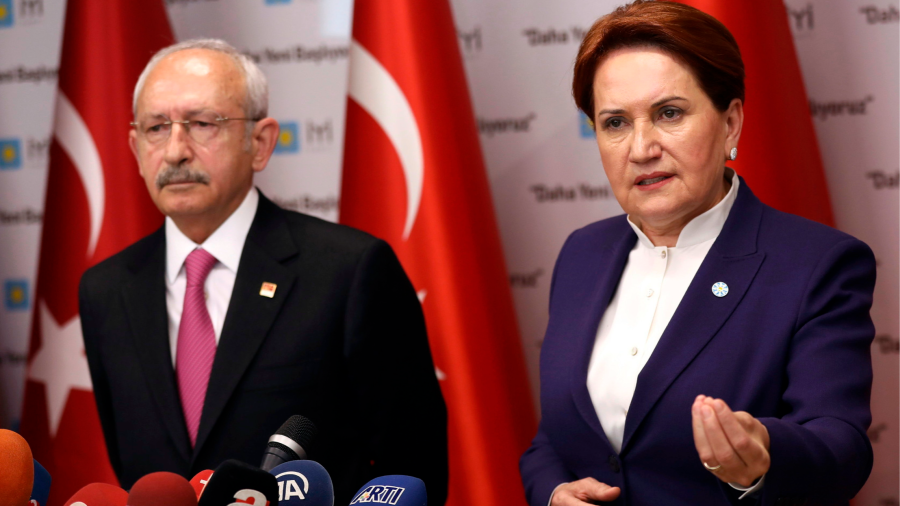
So fraught are relations between some Turkish opposition parties, which in theory are united against President Recep Tayyip Erdoğan, that they refuse to even have tea together.
Meral Akşener, leader of the Turkish nationalist İYİ party, said recently that she would “never sit at the same table” as the pro-Kurdish, leftwing People’s Democratic party (HDP). A senior member of the HDP responded that the feeling was mutual — members of the HDP would not even “drink tea in the same teahouse” as Akşener.
A volley of insults then ensued and was lapped up by the pro-Erdoğan media, which is eager to stoke splits in an alliance that is seen as the best chance to oust the man who has ruled Turkey for almost 20 years.
Erdoğan has been suffering from a decline in the polls as voters balk at high inflation, a collapse in the value of the lira and a sharp decline in living standards.
Opposition parties, which took control of big cities after fielding joint candidates in municipal elections in 2019, see elections that are scheduled for June next year as a historic opportunity to unseat the Turkish president. They have said they want to fix the damage Erdoğan has caused to the economy and restore the democratic freedoms that he has eroded.
The latest row, triggered by a dispute over the composition of a post-Erdoğan government, has served as a proxy for deeper disagreements and the crucial but still undecided issue of who will be the joint candidate chosen to take on Erdoğan in a presidential race.
“I think the İYİ party used [it] as an excuse to indirectly confront the CHP, which is something they’ve wanted to do for some time,” said Berk Esen, an assistant professor of political science at Istanbul’s Sabancı University. “There were already intra-coalition rifts brewing. This became a convenient issue for [the] İYİ party to use to rock the boat.”
At the core of the alliance is the CHP, a 99-year-old secularist left-leaning party that is the largest opposition force, and the İYİ party, which was founded in 2018 and has its roots in rightwing ultranationalism but has tried to tack to the centre.
While the two party leaders — the CHP’s softly spoken Kemal Kılıçdaroğlu and the İYİ party’s fiery Akşener — are publicly committed to working together, there are deep and growing rifts over the strategy for the upcoming vote.
The biggest source of tension is over the opposition’s joint candidate. The 73-year-old Kılıçdaroğlu is determined to put himself forward despite polling suggesting he is less likely to beat Erdoğan than several alternatives. Akşener, who has ruled herself out of the presidential race, would prefer to nominate Mansur Yavaş, the popular mayor of Ankara, according to party officials. But Kılıçdaroğlu has publicly ruled this out.
Another source of disquiet is İYİ party officials’ fears that Kılıçdaroğlu is doing backroom deals with smaller parties such as Deva, which is headed by Erdoğan’s former economy chief Ali Babacan. They fear that Kılıçdaroğlu will promise the economy brief that they covet to Babacan in exchange for his support for the CHP leader’s candidacy.
The İYİ party has also been unsettled by Kılıçdaroğlu’s overtures to the HDP, which is not part of the main six-party opposition alliance and is reviled by Turkish nationalists for its perceived support for Kurdish separatism. İYİ party officials see this as part of an effort by Kılıçdaroğlu to build support for his own candidacy.
CHP officials believe it is crucial to secure the support of a party that won almost 12 per cent of the vote in the last parliamentary elections. But İYİ party figures respond angrily to suggestions that they must build trust with the Kurdish-rooted party. “We are who we are,” said one person with close links to the party leadership. “There’s only so much we can accommodate them before it begins to hurt — and we’ve already done a lot of accommodating.”
Both İYİ and HDP accuse each other of putting their own interests before those of the county and being unwilling to compromise. “If you really want to defeat Erdoğan and transform the country into a liveable place, does it make sense not to talk to [the] HDP?” said Hişyar Özsoy, one of the party’s members of parliament.
Bülent Kuşoğlu, an MP and close ally of Kılıçdaroğlu, recently warned that if other parties insisted on opposing the CHP leader’s candidacy the opposition alliance would “fall apart”.
Officials from both the HDP and İYİ have said they could ultimately end up fielding their own candidate in the first round of the presidential contest and then uniting behind a single name if they succeed in forcing a run-off.
Analysts see that prospect as risky because of the damage that the rival opposition candidates could cause to each during the campaign — and the danger that Erdoğan could resort to fraud or other irregularities in a head-to-head second round that would be existential for him.
“In the kind of regime where electoral security is problematic, the opposition needs a victory in the first round,” said Seren Selvin Korkmaz, executive director of Istanbul-based think-tank IstanPol.
While the opposition front is still a long way from a complete collapse, the tensions have highlighted the challenges for an alliance that encompasses Kurds and Turks, secularists and conservatives, leftists and rightists, according to Esen, the Sabancı academic. “In Turkey, these are historically determined, very strong faultlines,” he said. “And Erdoğan is good at using them.”